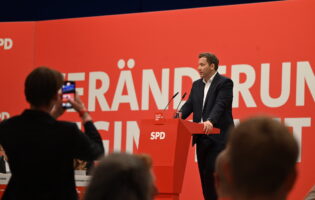Europe’s Migration Paralysis
As growing numbers of migrants seek a new life in Europe, in this Project Syndicate essay former German foreign minister Joschka Fischer calls on European leaders to overcome their paralysis on the issue and forge a united stance, both on pragmatic and humanitarian grounds. Ultimately, Europe needs immigration if it is going to continue to enjoy economic prosperity and high levels of social services.
BERLIN – For many centuries, Europe was a continent plagued by wars, famines, and poverty. Millions of Europeans were driven to emigrate by economic and social deprivation. They sailed across the Atlantic to North and South America, and to places as far away as Australia, to escape misery and seek a better life for themselves and their children.
All of them were, in the parlance of the current immigration and refugee debate, “economic migrants.” During the twentieth century, racial persecution, political oppression, and the ravages of two world wars became the predominant causes of flight.
Today, the European Union is one of the world’s richest economic regions. For decades, an overwhelming majority of Europeans have lived in peaceful democratic states that uphold their fundamental rights. Europe’s own misery and migration has become a distant (if not entirely forgotten) memory.
And yet many Europeans feel threatened once again, not by Russia, which is aggressively pushing outward against its neighbors, but by refugees and immigrants – the poorest of the poor. While hundreds of boat people have drowned in the Mediterranean Sea this summer, voices have emerged in almost every corner of Europe, 26 years after the fall of the Iron Curtain, calling for isolation, mass deportations, and the construction of new walls and fences. Throughout Europe, xenophobia and open racism are running rampant, and nationalist, even far-right parties are gaining ground.
Continue reading at Project Syndicate.









